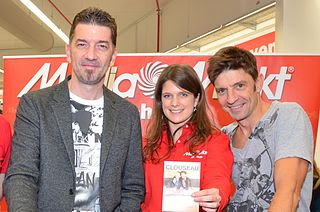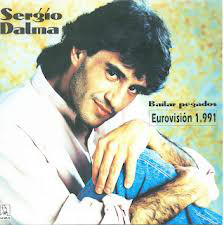
Clouseau is a Belgian pop group, having success in Belgium and the Netherlands since being established in the late 1980s. Apart from a brush with English material in the early 1990s they perform in Dutch. Their biggest hits are "Daar gaat ze" and "Passie".
Belgium participated in the Eurovision Song Contest 2008 with the song "O Julissi" written by Michel Vangheluwe. The song was performed by the band Ishtar. The Belgian entry for the 2008 contest in Belgrade, Serbia was selected through the national final Eurosong '08, organised by the Flemish broadcaster Vlaamse Radio- en Televisieomroeporganisatie (VRT). The competition featured twenty competing entries and consisted of seven shows. In the final on 9 March 2008, "O Julissi Na Jalini" performed by Ishtar was selected as the winner via a public televote. The song was later retitled as "O Julissi".
Yugoslavia made their penultimate Eurovision entry in the Eurovision Song Contest 1991, held in Rome, Italy.

"Bailar pegados" is a song recorded by Spanish singer Sergio Dalma, written by Julio Seijas and Luis Gómez Escobar. It is best known as the Spanish entry at the Eurovision Song Contest 1991, held in Rome.
Belgium was represented by Ingeborg, with the song "Door de wind", at the 1989 Eurovision Song Contest, which took place in Lausanne, Switzerland on 6 May. Ingeborg was the winner of the Belgian national final for the contest, held in Brussels on 18 March.
Belgium was represented by Dream Express, with the song "A Million in One, Two, Three", at the 1977 Eurovision Song Contest, which took place in London on 7 May.
Belgium was represented by Ann Christy, with the song "Gelukkig zijn", at the 1975 Eurovision Song Contest, which took place on 22 March in Stockholm. Christy was the winner of the Belgian national final for the contest, held on 1 March; she had previously taken part in the Belgian preselections of 1970, 1971 and 1973. Future Belgian representatives Micha Marah (1979) and Dream Express (1977) also took part.
Belgium was represented by Pierre Rapsat, with the song "Judy et Cie", at the 1976 Eurovision Song Contest, which took place on 3 April in The Hague. Rapsat was the winner of the Belgian national final for the contest, held on 21 January.
The Netherlands was represented by duo Maxine and Franklin Brown, with the song "De eerste keer", at the 1996 Eurovision Song Contest, which took place in Oslo on 18 May.
Belgium was represented by Emly Starr, with the song "Samson", at the 1981 Eurovision Song Contest, which took place in Dublin on 4 April.
Belgium was represented by synthpop band Telex, with the song "Euro-Vision", at the 1980 Eurovision Song Contest, which took place on 19 April in The Hague. Synthpop had never previously been tried in a Eurovision final, and the choice of song and group caused much comment, particularly regarding the implied sarcasm directed towards Eurovision in the song's deliberately banal lyrics.
The Netherlands was represented by duo Sandra and Andres, with the song "Als het om de liefde gaat", at the 1972 Eurovision Song Contest, which took place on 25 March in Edinburgh. Sandra and Andres, an established act with five previous top 10 hits to their name, were internally selected by broadcaster NOS to be the Dutch representatives and the song was chosen at the national final on 22 February. Sandra.
Belgium was represented by Lize Marke, with the song "Als het weer lente is", at the 1965 Eurovision Song Contest, which took place on 20 March in Naples. Marke was chosen internally to be the Belgian representative, and the song was chosen in the national final on 13 February. Marke had previously finished second in the Belgian preselection in 1963.
Denmark was represented by Anders Frandsen, with the song "Lige der hvor hjertet slår", at the 1991 Eurovision Song Contest, which took place on 4 May in Rome. "Lige der hvor hjertet slår" was chosen as the Danish entry at the Dansk Melodi Grand Prix on 16 March.
Germany was represented by six-member group Atlantis 2000, with the song "Dieser Traum darf niemals sterben", at the 1991 Eurovision Song Contest, which took place on 4 May in Rome. "Dieser Traum darf niemals sterben" was the winner of the German national final, held on 21 March.
Finland was represented by Kaija Kärkinen, with the song "Hullu yö", at the 1991 Eurovision Song Contest, which took place on 4 May in Rome. "Hullu yö" was chosen as the Finnish entry at the national final organised by broadcaster Yle and held on 2 March.
Belgium participated in the Eurovision Song Contest 2012 with the song "Would You?" written by Nina Sampermans, Jean Bosco Safari and Walter Mannaerts. The song was performed by Iris, who was internally selected by the Flemish broadcaster Vlaamse Radio- en Televisieomroeporganisatie (VRT) in November 2011 to represent the nation at the 2012 contest in Baku, Azerbaijan. The song was selected through the national final Eurosong 2012: Een song voor Iris, which was organised by VRT and featured two songs. In the final on 17 March 2012, "Would You?" was selected as the winning song after gaining 53% of the public televote.
Austria was represented by the band Mess consisting of Fritz and Elisabeth 'Lizzi' Engstler. They performed their song "Sonntag", at the 1982 Eurovision Song Contest, which took place in Harrogate on 24 April. Mess was the winner of the Austrian national final for the contest, held on 25 March. The song was chosen through a national final organised by broadcaster ORF.
Belgium participated in the Eurovision Song Contest 2018 with the song "A Matter of Time" written by Laura Groeseneken, Alex Callier and Maxime Tribeche. The song was performed by Sennek, which is the artistic name of singer Laura Groeseneken who was internally selected by the Flemish broadcaster Vlaamse Radio- en Televisieomroeporganisatie (VRT) in September 2017 to represent the nation at the 2018 contest in Lisbon, Portugal. The song, "A Matter of Time", was presented to the public on 5 March 2018.
Belgium participated in the Eurovision Song Contest 2021 with the song "The Wrong Place" written by Alex Callier and Charlotte Foret. The song was performed by the band Hooverphonic, which was internally selected by the Belgian broadcasters Vlaamse Radio- en Televisieomroeporganisatie (VRT) and Radio Télévision Belge de la Communauté Française (RTBF) in March 2020 to represent the nation at the 2021 contest in Rotterdam, Netherlands, after they were due to compete in the 2020 contest with "Release Me" before the 2020 event's cancellation. The song, "The Wrong Place", was presented to the public on 4 March 2021.

